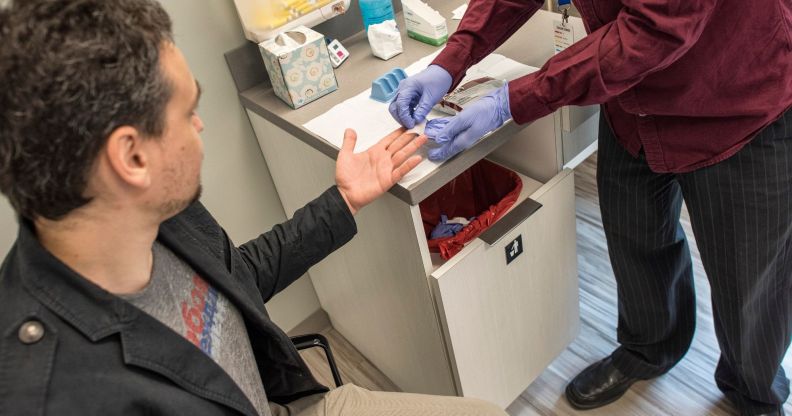Gay and bi trans men at higher risk of HIV infection, ‘vital’ new studies reveal

Trans men are reportedly more likely to have HIV according to recent studies. (Getty)
More needs to be done to protect gay trans men from HIV, according to two newly released studies
The two reports – one from New York, the other from Germany – suggest trans men who have sex with men are more likely to live with HIV than the general population.
A study at the Callen-Lorde Community Health Center in New York City showed a startling difference between infection rates of trans and cisgender men.
Looking at data from 577 trans men who sought HIV care between 2009 and 2010, researchers found that, among the 250 trans men from the group who used an HIV test while seeking care, 2.8 per cent tested positive.
This is a significantly higher rate of prevalence compared to US cis men, who have a 0.41 per cent positive rate.
Public figures and researchers have since urged health institutions to recognise trans men in HIV prevention schemes.
UK charity Aidsmap noted that trans men are typically absent from studies around HIV and, as a result, data around the group’s sexual well-being can lead to increased risk.
A similar report from the Robert Koch Institute compared data of 122 trans men who have sex with men and 22,000 cisgender gay and bisexual men.
It found that only 24 per cent of trans men reported easy access to HIV tests, compared to the 41 per cent of cis men who reported the same.
Access to STI tests is similarly difficult for trans men, with only 45 per cent able to easily obtain required tests compared to 55 per cent of cis men, the Robert Koch report found.
It also looked at systemic issues for the disparity in access to care, including socioeconomic issues and mental health factors.
According to the survey, trans men were four times as likely to suffer from severe anxiety or depression compared to cis men.
Additionally, research suggested that suicide ideation is far more common in trans men compared to cis counterparts.
‘Inequalities and transphobic barriers to care’
Eli Fitzgerald is a trans campaigner, living with HIV, and he tells PinkNews studies like these are a “vital and urgently needed step forward” but adds that representation in studies like this is “overdue”.
“The findings tell us that we need to be doing more to represent trans men, not just in terms of access to HIV and STI testing, but further into research,” he says.
“In terms of the prevalence of HIV and trans men, I am grateful to see the potential for an actual true proportional reflection of these numbers instead of previously what has felt like guess work.”
He wants a “rethink” in the approach to HIV and sti testing within trans masculine communities.
“We need to improve trans inclusion in access to HIV and sexual health care, because without addressing inequalities and transphobic barriers to care then we won’t be able to access representational data on HIV prevalence for this historically underrepresented community.”
Moving forwards there needs to be a continual push for trans men’s inclusion within all HIV research and data, we can’t continue to rely on the limited information there is at the moment especially if we are aiming towards ending HIV transmission by 2030.
“We need to acknowledge and listen to the trans men who are accessing these services to find areas of improvement, but there also needs to be a further understanding as to why some trans men are not accessing these services without labels such as hard to reach.
“Without addressing the inequalities trans men face, and the transphobic barriers to accessing care then we will not make progress moving forward.”
He adds the he hopes research of this kind is “the beginning of a wider international boost in trans men and trans masculine representation within HIV and sexual health”.
Campaigner Matthew Hodson described the two studies as “much-needed data” to help outline the volume of the issue.
How did this story make you feel?

